
The National Security Agency (NSA) is a national-level intelligence agency of the United States Department of Defense, under the authority of the Director of National Intelligence (DNI). The NSA is responsible for global monitoring, collection, and processing of information and data for foreign and domestic intelligence and counterintelligence purposes, specializing in a discipline known as signals intelligence (SIGINT). The NSA is also tasked with the protection of U.S. communications networks and information systems. The NSA relies on a variety of measures to accomplish its mission, the majority of which are clandestine. The existence of the NSA was not revealed until 1975. The NSA has roughly 32,000 employees.

Fort George G. Meade is a United States Army installation located in Maryland, that includes the Defense Information School, the Defense Media Activity, the United States Army Field Band, and the headquarters of United States Cyber Command, the National Security Agency, the Defense Courier Service, Defense Information Systems Agency headquarters, and the U.S. Navy's Cryptologic Warfare Group Six. It is named for George G. Meade, a Union general from the U.S. Civil War, who served as commander of the Army of the Potomac. The fort's smaller census-designated place includes support facilities such as schools, housing, and the offices of the Military Intelligence Civilian Excepted Career Program (MICECP).

A reconnaissance aircraft is a military aircraft designed or adapted to perform aerial reconnaissance with roles including collection of imagery intelligence, signals intelligence, as well as measurement and signature intelligence. Modern technology has also enabled some aircraft and UAVs to carry out real-time surveillance in addition to general intelligence gathering.

On 1 May 1960, a United States U-2 spy plane was shot down by the Soviet Air Defence Forces while conducting photographic aerial reconnaissance deep inside Soviet territory. The single-seat aircraft, flown by American pilot Francis Gary Powers, had taken off from Peshawar, Pakistan, and crashed near Sverdlovsk, after being hit by an S-75 Dvina surface-to-air missile. Powers parachuted to the ground safely and was captured.
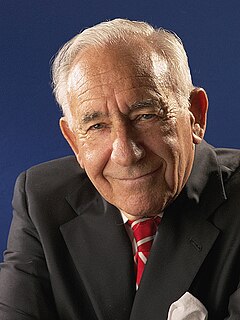
David Kahn is an American historian, journalist, and writer. He has written extensively on the history of cryptography and military intelligence.

The Central Security Service (CSS) is a combat support agency of the United States Department of Defense which was established in 1972 to integrate the National Security Agency (NSA) and the Service Cryptologic Components (SCC) of the United States Armed Forces in the field of signals intelligence, cryptology, and information assurance at the tactical level. In 2002, the CSS had approximately 25,000 uniformed members. It is part of the United States Intelligence Community.

The National Cryptologic Museum (NCM) is an American museum of cryptologic history that is affiliated with the National Security Agency (NSA). The first public museum in the U.S. Intelligence Community, NCM is located in the former Colony Seven Motel, just two blocks from the NSA headquarters at Fort George G. Meade in Maryland. The motel was purchased, creating a buffer zone between the high security main buildings of the NSA and an adjacent highway. The museum opened to the public on December 16, 1993, and now hosts about 50,000 visitors annually from all over the world.

The United States Army Security Agency (ASA) was the United States Army's signals intelligence branch from 1945 to 1976. The Latin motto of the Army Security Agency was Semper Vigiles, which echoes the declaration, often mistakenly attributed to Thomas Jefferson, that "The price of liberty is eternal vigilance."

On 15 April 1969, a United States Navy Lockheed EC-121M Warning Star of Fleet Air Reconnaissance Squadron One (VQ-1) on a reconnaissance mission was shot down by a North Korean MiG-21 aircraft over the Sea of Japan. The plane crashed 90 nautical miles (167 km) off the North Korean coast and all 31 Americans on board were killed, which constitutes the largest single loss of U.S. aircrew during the Cold War era.
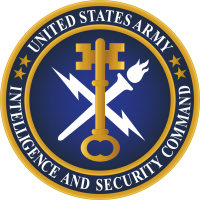
The United States Army Intelligence and Security Command (INSCOM) is a direct reporting unit that conducts intelligence, security, and information operations for United States Army commanders, partners in the Intelligence Community, and national decision-makers. INSCOM is headquartered at Fort Belvoir, Virginia.
After the end of World War II, all the Western allies began a rapid drawdown of military forces, including those of signals intelligence. At the time, the US still had a COMINT organization split between the Army and Navy. A 1946 plan listed Russia, China, and a [redacted] country as high-priority targets.
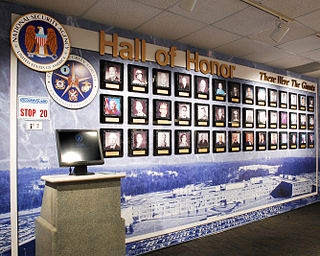
The Hall of Honor is a memorial at the National Security Agency headquarters in Fort Meade, Maryland. It honors individuals who rendered distinguished service to American cryptology.
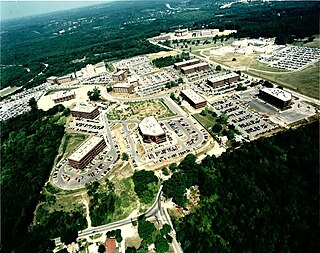
The Friendship Annex, also known as FANX or FANEX, is a National Security Agency (NSA) facility complex located in Linthicum, Maryland, near the Baltimore Washington International Airport (BWI). Established in the 1970s, the complex consists of multiple buildings and serves multiple roles as a cyber espionage station, electronic intelligence processing facility, and NSA Broadcast Network television studio. It is also the primary campus of the National Cryptologic School.

Between 1946 and 1960, the United States Air Force conducted aerial reconnaissance flights over the Soviet Union in order to determine the size, composition, and disposition of Soviet forces. Aircraft used included the Boeing B-47 Stratojet bomber and—from 1956—the Lockheed U-2 spy plane specifically designed for high-altitude reconnaissance flight. The overflight program was ended following the 1960 U-2 incident.

Initially established as the Air Force (USAF) Security Group in June, 1948, the USAF Security Service (USAFSS) was activated as a major command on Oct 20, 1948

The 1958 C-130 shootdown incident was the shooting down of an American Lockheed C-130A-II-LM reconnaissance aircraft which had intruded into Soviet airspace during a reconnaissance mission along the Turkish-Armenian border.

NESTOR was a family of compatible, tactical, wideband secure voice systems developed by the U.S. National Security Agency and widely deployed during the Vietnam War through the late Cold War period of the 1980s. NESTOR consists of three systems. The KY-8 was used in vehicular and afloat applications; the KY-28 was the airborne version; and the KY-38 was the portable or man-pack model. About 30,000 NESTOR equipments were produced prior to their replacement by the VINSON secure voice family.
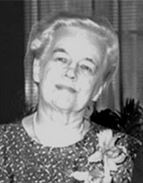
Juliana Mickwitz (1889-1976) was a Finnish-born Russian who became a naturalized American citizen. She was employed with the American military and later National Security Agency as a translator, linguist and cryptanalyst. She was inducted into the Cryptologic Hall of Honor in 2012.

Minnie M. Kenny was a cryptanalyst, educator and equal opportunity activist who worked at the National Security Agency (NSA). She served as Deputy Commandant at the National Cryptologic School and was responsible for creating scholarships for NSA employees. The recipient of numerous awards, including the Meritorious and the Exceptional Civilian Service Awards, the presidential Meritorious Executive Award and Distinguished Service Award of the CIA, Kenny was inducted into the Cryptologic Hall of Honor in 2009.

















